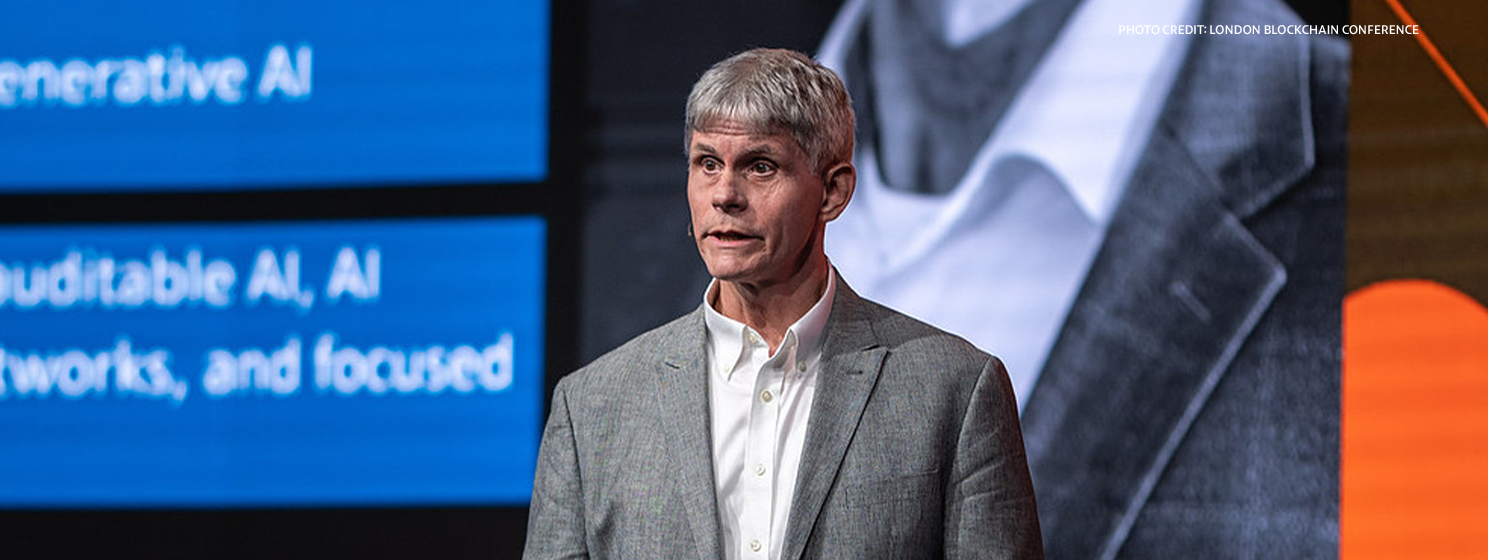|
Getting your Trinity Audio player ready...
|
Blockchain can bring auditability, compliance, and trust to artificial intelligence (AI) and generative AI (GenAI) systems, says FICO analytics chief.
- Dr. Scott Zoldi on auditing AI
- Blockchain is the enforcer of AI tech
- Generative AI is not a perfect tool
- AI is a perfect combo for blockchain
On October 22, Dr. Scott Zoldi, Chief Analytics Officer of analytics company FICO, explained how blockchain technology can help solve some of the issues around AI and trust.
In his keynote speech from the ‘visionaries stage’ of the London Blockchain Conference, Zoldi warned that when looking at deep learning models, “the black box of AI is getting darker and darker, and the lack of transparency is increasing.”
To meet this challenge, more transparency is needed, and according to Zoldi, blockchain is the technology that can shed light on the process.
“Blockchain will govern AI,” he said. “There is one source of truth, the record of development on the blockchain.”
Zoldi outlined how generative AI faces unique challenges to its development, one being that it is often treated as a science project rather than an enterprise-grade tool.

The development of frontier AI models often involves pushing the technology to its limits and expanding its knowledge base. This can end up hampering the accuracy of its knowledge when applied by businesses.
“Decisions are going to be made based on these models that impact people’s finances, jobs, families,” said Zoldi. For this reason, he argued that it has become integral to AI development and deployment that it can be auditable.
Blockchain the enforcer
Zoldi suggested that blockchain can be the “enforcer” of standards in AI development and deployment, through its immutable and auditable architecture.
For example, when it comes to development, he explained that “the blockchain is not just a checklist of ‘I met my task,’ it’s a successive chain of successes and failures… it records the whole process and every stage.”
Of course, it doesn’t matter if you’ve built a responsible model if you don’t know how to monitor it and, as Zoldi noted, “typically the people who are monitoring a model are not the people who built it.”
This, he suggested, can also be solved by putting monitoring processes on an immutable blockchain. Companies can then foster an increased level of trust in how AI is applied by clearly demonstrating how it is monitored and utilized.
Focused AI
Another problem that Zoldi identified was that AI development’s push for ever-more universally knowledgeable models can often come at the expense of expertise and competence at specific business needs.
“Generative AI can provide a lot of value and efficiency, but it is not a perfect tool… they know as much about how to make mushroom soup as financial services,” said Zoldi. “We have to focus on the problem we’re trying to solve and get pragmatic about what we need.”
This is where so-called “focused language models” (FLMs) come in.

Citing studies by FICO, Zoldi said that focused models trained “responsibly” on specific and focused data sets outperformed generalist AI on ‘instruction following’ and ‘financial knowledge,’ while generalist models only outperform on ‘universal knowledge.’
This indicates that focused models may offer better, more accurate solutions for many companies.
In September, FICO launched its Focused Foundation Model for financial services, consisting of Focused Language Models (FLMs) and a Focused Sequence Model (FSM).
Speaking to Forbes at the time, Zoldi said that “unlike general-purpose LLMs, FLMs are purpose-built for highly precise, deterministic decisioning and regulated agentic tasks.”
He added that “they are not primarily intended for use in open-ended conversational chatbots.”
FICO claims that its FLMs can produce high-quality results with a 1,000-fold reduction in computing requirements compared to general-purpose LLMs. That efficiency comes from “deep domain curation.”
In other words, rather than building their models on petabytes of text across the web, FICO trains its models on financial services data, filtered to retain only task-relevant patterns. The result, claims the company, is a compact, highly tuned model that produces “higher quality results with faster inference.”
Speaking to a packed room full of tech innovators, developers, and entrepreneurs at the London Blockchain Conference, Zoldi explained that when training these FLM models, “the first step is that you have to define the problem… in addition, they need to define examples of when a task is done well and not well.”
He went on to suggest that the best way to ensure this is done well and transparently is through the blockchain.
“We need this level of auditability, transparency, monitoring,” said Zoldi. “We need the immutability of the blockchain to know when we should apply it.”
AI and blockchain are a popular combo
This view of the advantages blockchain can offer to AI is not unique to Zoldi and FICO.
In May, Web3 infrastructure provider Quicknode published a report arguing that “decentralized AI systems represent a significant leap forward in both scientific research and enterprise applications.”
The company suggested that by leveraging blockchain technology, “these systems can securely share knowledge, supporting trust in decision-making without the need for a central authority.” It added that “this decentralized approach enhances the capabilities of AI, allowing for more robust and transparent processes.”
Meanwhile, multinational tech giant IBM (NASDAQ: IBM) has also made the case for the benefits of combining blockchain and AI, to the mutual benefit of both.

“Blockchain’s digital record offers insight into the framework behind AI and the provenance of the data that it is using, addressing the challenge of explainable AI,” said IBM. “This insight helps improve trust in data integrity and in the recommendations that AI provides.”
The company added that “using blockchain to store and distribute AI models provides an audit trail, and pairing blockchain and AI can enhance data security.”
To support this, IBM also cited use cases in the life sciences and pharmaceutical industries, where blockchain and AI can enhance visibility and traceability in the drug supply chain, thereby increasing the success rate of clinical trials.
“Combining advanced data analysis with a decentralized framework for clinical trials enables data integrity, transparency, patient tracking, consent management, and automation of trial participation and data collection,” said IBM.
These are precisely the kind of advantages espoused by Dr. Zoldi, who, rounding off his October 22 keynote to the London Blockchain Conference, reiterated that “blockchain is the key to responsible AI.”
In order for artificial intelligence (AI) to work right within the law and thrive in the face of growing challenges, it needs to integrate an enterprise blockchain system that ensures data input quality and ownership—allowing it to keep data safe while also guaranteeing the immutability of data. Check out CoinGeek’s coverage on this emerging tech to learn more why Enterprise blockchain will be the backbone of AI.
Watch: AI is a double-edged sword

 02-23-2026
02-23-2026 




